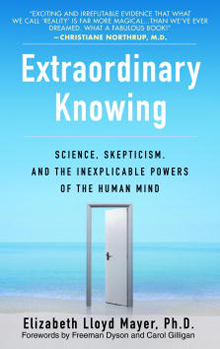How'd I Know That?

Premonitions. Spot-on insights. Logic meets ESP in a risky, profound, convincing new book.
When two of the most insightful heavyweights in their respective fields—psychologist Carol Gilligan and physicist Freeman Dyson—introduce a book, you know you're in for an eye-opening experience. In Extraordinary Knowing (Bantam), psychoanalyst Elizabeth Lloyd Mayer offers a revolutionary new way of understanding the world. Turning conventional thinking on its head, she suggests that just as we can "read" certain images two ways, but never at the same time (think of that "trick" picture in which the girl holding a mirror seems to shape-shift into a skull), so we may be able to go back and forth between two kinds of knowledge—rational and intuitive—without losing our minds. Mayer's own worldview changed in 1991 when, stymied by the theft of her young daughter's harp, she overrode her doubts and contacted a dowser in Arkansas to help her recover it. Astonishingly, he found the harp in California—without ever leaving home. "This changes everything," Mayer was stunned to realize, and she began plowing through mountains of often dotty research on extrasensory perception to unearth decades' worth of viable studies (some sponsored by the CIA) that were routinely discounted by mainstream scientists. As she probed, patients, colleagues, and even a famed neurosurgeon confessed to her, often with embarrassment, that sometimes they just knew things—the exact moment to operate, the hidden location of a deadly disease. Their shame intrigued her and confirmed her sense that our reliance as a culture on conclusions based on readily identifiable evidence forces us to tiptoe around experiences we can't explain instead of facing our deep-seated fear of the unknown. Mayer's work is ultimately about making connections, about the way people break through to one another: "What if...the perceptions we now label extrasensory…could be reliably trained to deepen people's ordinary knowing of each other, extending our capacities for empathy and compassion?" The question alone is thrilling; so is Mayer's courage in asking it.



